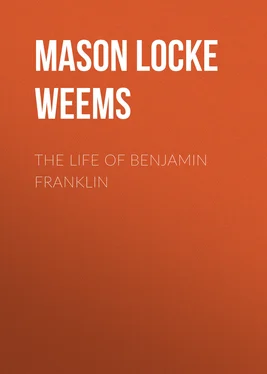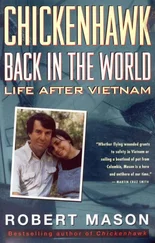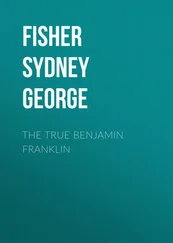Mason Locke Weems - The Life of Benjamin Franklin
Здесь есть возможность читать онлайн «Mason Locke Weems - The Life of Benjamin Franklin» — ознакомительный отрывок электронной книги совершенно бесплатно, а после прочтения отрывка купить полную версию. В некоторых случаях можно слушать аудио, скачать через торрент в формате fb2 и присутствует краткое содержание. Жанр: Биографии и Мемуары, История, foreign_edu, foreign_antique, foreign_prose, на английском языке. Описание произведения, (предисловие) а так же отзывы посетителей доступны на портале библиотеки ЛибКат.
- Название:The Life of Benjamin Franklin
- Автор:
- Жанр:
- Год:неизвестен
- ISBN:нет данных
- Рейтинг книги:5 / 5. Голосов: 1
-
Избранное:Добавить в избранное
- Отзывы:
-
Ваша оценка:
- 100
- 1
- 2
- 3
- 4
- 5
The Life of Benjamin Franklin: краткое содержание, описание и аннотация
Предлагаем к чтению аннотацию, описание, краткое содержание или предисловие (зависит от того, что написал сам автор книги «The Life of Benjamin Franklin»). Если вы не нашли необходимую информацию о книге — напишите в комментариях, мы постараемся отыскать её.
The Life of Benjamin Franklin — читать онлайн ознакомительный отрывок
Ниже представлен текст книги, разбитый по страницам. Система сохранения места последней прочитанной страницы, позволяет с удобством читать онлайн бесплатно книгу «The Life of Benjamin Franklin», без необходимости каждый раз заново искать на чём Вы остановились. Поставьте закладку, и сможете в любой момент перейти на страницу, на которой закончили чтение.
Интервал:
Закладка:
Now certainly, continued Ben, all this is very clear and easy to be understood. Well then, since all life, whether of man or beast, or vegetables, is a kind loan of God, and to be taken back again, the question is whether the way in which we see it is taken back is not the best way . It is true, life being the season of enjoyment, is so dear to us that there is no way of giving it up which is not shocking. And this horror which we feel at the thought of having our own lives taken from us we extend to the brutes. We cannot help feeling shocked at the butcher killing a lamb, or one animal killing another. Nay, tell even a child who is looking with smiles on a good old family horse that has just brought a bag of flour from the mill, or a load of wood from the forest, that this his beloved horse will by and by be eaten up of the buzzards, and instantly his looks will manifest extreme distress. And if his mother, to whom he turns for contradiction of this horrid prophecy, should confirm it, he is struck dumb with horror, or bursts into strong cries as if his little heart would break at thought of the dismal end to which his horse is coming. These, though very amiable, are yet the amiable weaknesses of the child, which, it is the duty of man to overcome. This animal was created of his God for the double purpose of doing service to man, and of enjoying comfort himself. And when these are accomplished, and that life which was only lent him is recalled, is it not better that nature's scavengers, the buzzards, should take up his flesh and keep the elements sweet, than that it should lie on the fields to shock the sight and smell of all who pass by? The fact is, continued Ben, I see that all creatures that live, whether men or beasts, or vegetables, are doomed to die. Now were it not a greater happiness that this universal calamity, as it appears, should be converted into an universal blessing, and this dying of all be made the living of all? Well, through the admirable wisdom and goodness of the Creator, this is exactly the case. The vegetables all die to sustain animals; and animals, whether birds, beasts, or fishes, all die to sustain man, or one another. Now, is it not far better for them that they should be thus continually changing into each other's substance, and existing in the wholesome shapes of life and vigour, than to be scattered about dying and dead, shocking all eyes with their ghastly forms, and poisoning both sea and air with the stench of their corruption?
This scrutiny into the economy of nature in this matter, gave him such an exalted sense of nature's Great Author, that in a letter to his father, to whom he made a point of writing every week for the benefit of his corrections, he says, though I was at first greatly angered with Tryon, yet afterwards I felt myself much obliged to him for giving me such a hard nut to crack, for I have picked out of it one of the sweetest kernels I ever tasted. In truth, father, continues he, although I do not make much noise or show about religion, yet I entertain a most adoring sense of the Great First Cause; insomuch that I had rather cease to exist than cease to believe him all wise and benevolent.
In the midst, however, of these pleasing speculations, another disquieting idea was suggested.—Is it not cruel, after giving life to take it away again so soon? The tender grass has hardly risen above the earth, in all its spring-tide green and sweetness, before its beauty is all cropped by the lamb; and the playful lamb, full dressed in his snow-white fleece, has scarcely tasted the sweets of existence, before he is caught up by the cruel wolf or more cruel man. And so with every bird and fish: this has scarcely learned to sing his song to the listening grove, or that to leap with transport from the limpid wave, before he is called to resign his life to man or some larger animal.
This was a horrid thought, which, like a cloud, spread a deep gloom over Ben's mind. But his reflections, like the sunbeams, quickly pierced and dispersed them.
These cavillers, said he, in another letter, are entirely wrong. They wish, it seems, long life to the creatures; the Creator wishes them a pleasant one. They would have but a few to exist in a long time; he a great many in a short time. Now as youth is the season of gaiety and enjoyment, and all after is comparatively insipid, is it not better, before that pleasant state is ended in sorrow, the creature should pass away by a quick and generally easy fate, and appear again in some other shape? Surely if the grass could reason, it would prefer, while fresh and beautiful, to be cropped by the lamb and converted into his substance, than, by staying a little longer, to disfigure the fields with its faded foliage. And the lamb too, if he could but think and choose, would ask for a short life and a merry one , rather than, by staying a little longer, degenerate into a ragged old sheep, snorting with the rattles, and dying of the rot, or murrain.
But though Ben, at the tender age of sixteen, and with no other aid than his own strong mind, could so easily quell this host of atheistical doubts, which Tryon had conjured up; yet he hesitated not to become his disciple in another tenet. Tryon asserted of animal food, that though it gave great strength to the body, yet it contributed sadly to grossness of blood and heaviness of mind; and hence he reasoned, that all who wish for cool heads and clear thoughts should make their diet principally of vegetables. Ben was struck with this as the perfection of reason, and entered so heartily into it as a rare help for acquiring knowledge, that he instantly resolved, fond as he was of flesh and fish, to give both up from that day, and never taste them again as long as he lived. This steady refusal of his to eat meat, was looked on as a very inconvenient singularity by his brother, who scolded him for it, and insisted he should give it up. Ben made no words with his brother on this account.—Knowing that avarice was his ruling passion, he threw out a bait to James which instantly caught, and without any disturbance produced the accommodation he wished. "Brother," said he to him one day as he scolded; "you give three shillings and six pence a week for my diet at this boarding-house; give me but half that money and I'll diet myself without any farther trouble or expense to you." James immediately took him at his word and gave him in hand his week's ration, one shilling and nine pence, which after the Boston exchange, six shillings to the dollar, makes exactly thirty-seven and a half cents. Those who often give one dollar for a single dinner, and five dollars for a fourth of July dinner, would look very blue at an allowance of thirty-seven and a half cents for a whole week. But Ben so husbanded this little sum, that after defraying all the expenses of his table, he found himself at the end of the week, near twenty cents in pocket—thus expending not quite three cents a day! This was a joyful discovery to Ben—twenty cents a week, said he, and fifty-two weeks in the year; why, that is upwards of ten dollars in the twelve months! what a noble fund for books! Nor was this the only benefit he derived from it; for, while his brother and the journeymen were gone to the boarding-house to devour their pork and beef, which, with lounging and picking their teeth, generally took them an hour, he stayed at the printing-office; and after dispatching his frugal meal, of boiled potatoe, or rice; or a slice of bread with an apple; or bunch of raisins and a glass of water, he had the rest of the time for study. The pure fluids and bright spirits secreted from such simple diet, proved exceedingly favourable to that clearness and vigour of mind, and rapid growth in knowledge which his youthful soul delighted in.
I cannot conclude this chapter without making a remark which the reader has perhaps anticipated—that it was by this simple regimen, vegetables and water, that the Jewish seer, the holy Daniel, while a youth, was of Providence made fit for all the learning of the East; hence arose his bright visions into futurity, and his clear pointings to the far distant days of the Messiah, when the four great brass and iron monarchies of Media, Persia, Grecia, and Rome, being overthrown, Christ should set up his last golden monarchy of Love, which, though faint in the beginning as the first beam of the uncertain dawn, shall yet at length brighten all the skies, and chase the accursed clouds of sin and suffering from the abodes of man and beast.
Читать дальшеИнтервал:
Закладка:
Похожие книги на «The Life of Benjamin Franklin»
Представляем Вашему вниманию похожие книги на «The Life of Benjamin Franklin» списком для выбора. Мы отобрали схожую по названию и смыслу литературу в надежде предоставить читателям больше вариантов отыскать новые, интересные, ещё непрочитанные произведения.
Обсуждение, отзывы о книге «The Life of Benjamin Franklin» и просто собственные мнения читателей. Оставьте ваши комментарии, напишите, что Вы думаете о произведении, его смысле или главных героях. Укажите что конкретно понравилось, а что нет, и почему Вы так считаете.









![Benjamin Franklin - Memoirs of Benjamin Franklin; Written by Himself. [Vol. 2 of 2]](/books/747975/benjamin-franklin-memoirs-of-benjamin-franklin-wr-thumb.webp)
![Benjamin Franklin - Memoirs of Benjamin Franklin; Written by Himself. [Vol. 1 of 2]](/books/748053/benjamin-franklin-memoirs-of-benjamin-franklin-wr-thumb.webp)

